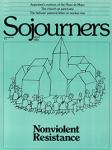Like many of you, I suppose, many of us at Sojourners gathered around the television for the last episode of M*A*S*H. Some had been faithful M*A*S*H watchers for years; others had seen it only occasionally. But I think it's safe to say that M*A*S*H is the only TV series that any of us watched with any regularity. (Though there is a new group gathering on Thursday nights to watch Hill Street Blues.)
The special two-and-a-half-hour farewell to MASH (Mobile Army Surgical Hospital) 4077 was a big night. (Once in a while at Sojourners we enjoy doing something that the rest of America is also doing.) Danny Collum pitched a large, green tent in the dining room of one of our households, complete with cots and a cardboard sign that read "Welcome to the Swamp: MASH 4077."
A few of us dressed up in hospital pants and army jackets. Seven-year-old Nathan Tamialis was a convincing Radar O'Reilly. Joyce Hollyday, clad in a beach towel and shower cap, was, of course, Margaret Hoolihan. And our publisher, the lovely Joe Roos, was the hit of the evening as Klinger. After buying a flowered hat earlier in the evening at Value Village, our local thrift store, it took only earrings, a string of pearls, someone's grandmother's black eyelet dress, and combat boots to make his outfit complete.
The highest drama of the night was making our way through our neighborhood to the house where we gathered to watch the show. Considering the way we looked, we were probably safer that night than any other: who would dare to bother such an unusual-looking group?
The last M*A*S*H episode sensitively portrayed the blend of humor, emotion, and political insight that has always characterized the series. Like everyone else, I was touched by the farewells exchanged between the characters who had become such a family together. But the line that hurt the most came near the end. The scene was the operating room (OR), and the MASH unit was tending their last group of wounded.
The announcer on the radio broadcast being piped into the OR was counting down the hours left until the peace treaty would take effect, and then assessed the cost of the Korean War in lives lost, people wounded, and property destroyed. In all, there were more than two million casualties, mostly Korean, and almost half the population of Korea had been made refugees. Fifty thousand U.S. soldiers had been killed.
Then almost as an aside, a small news item was reported. The U.S. government had just approved military aid for a "war against communism" in a place called Vietnam. "Where the heck is Vietnam?" asked Klinger, as the MASH crew went about their work.
On the day when one war had come to an end, seeds of another were being sown. I felt a pang in my heart and a lump in my throat. I thought back to what Vietnam had come to mean to all involved: the American troops who fought that war in Southeast Asia, those of us who fought against the war at home and, as always, the countless innocent people who lived in yet another country devastated by an American war.
The pointed comment about Vietnam in the last M*A*S*H episode was made even more tragic in light of that day's announcement from the White House that the Reagan administration would seek an additional $60 million in military aid to El Salvador this year. (The figure has since been increased to $110 million.) The late news after M*A *S*H showed Ronald Reagan, George Shultz, and Jeanne Kirkpatrick talking again about communist subversion, Soviet influence, and guerrilla movements which are a threat to our country's national security.
The facts never seem to matter, and the people who suffer the consequences matter even less. One could say that we never seem to learn. Or one could say that we ought to have learned by now that governments have a habit of seeking their narrow self-interest, lying about their reasons for prosecuting wars, and ignoring what happens to the people who simply get in the way.
It was obvious that the men and women of the 4077 had had their fill of the war and were ready to go home. One wonders if the politicians and generals who make the wars will ever have their fill.
Jim Wallis is editor-in-chief of Sojourners.

Got something to say about what you're reading? We value your feedback!
